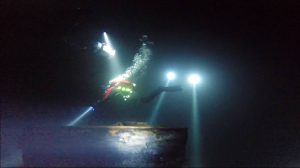What will you learn?
There is nothing quite as mysterious or unique as dropping below the surface into the darkness. Although you’ve been scuba diving at a site many times before, at night you drop into a whole new world and watch it come to life under the glow of your dive light. The scene colours change, the site seems somehow more alive, and if you’re diving down south the life changes as day creatures retire and nocturnal organisms emerge. If you like the sounds of this, the PADI Night Diver Specialty Course is your next course.

If you’ve ever wondered what the dive will look like when the sun goes down you’ll be pleasantly surprised when you take your PADI Night Diver Specialty course with us.
Learn how to handle “Light’s Out” equipment failures, light communications and more.
Prerequisites:
PADI (Junior) Open Water Divers or higher, who are at least 12 years old, can enrol in the Night Diver specialty course.
Cost: $150+HST Includes PADI Night Diver Manual
Additional Details:
Scuba diving at night teaches you to focus on what you can see in your light’s beam, so a suitable torch is always recommended, see our store staff and instructors for recommendations.
You’ll have a greater focus on controlling your buoyancy, on staying with your buddy and on paying attention to details you may overlook during the day. During three night dives, you’ll practice:
- Light handling and communication techniques.
- Entering, exiting and navigating in the dark.
- Identifying how plants and animals differ or change behaviour at night.
Also, the first dive of this Night Diver Course may credit as a dive toward your PADI Advanced Open Water certification (although we generally suggest you do all 5 of the minimum dives regardless)– ask your instructor about earning credit.
To enrol in the course, come and visit our store, pickup your PADI Night Diver materials. By studying before class, you’ll be better prepared for the thrill of exploring the underwater world at night.
What gear will you need?
Along with your full scuba equipment setup, you’ll need a primary dive light and want to have a backup light, too.
Sign Up Now and earn your next certification with DDS.
Where do I go from here?
Here are some popular examples of courses commonly taken by graduates of this course:
- Peak Performance Buoyancy
- Advanced Open Water
- Cavern Diver
- Deep Diver
- Rescue Diver
- Wreck Diver
- Intro to Tech
